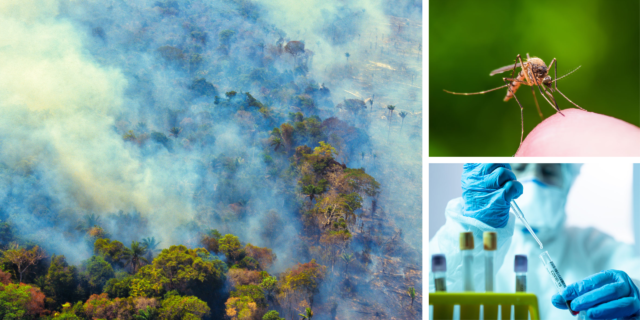Climate change and the proliferation of vector-borne diseases poses a significant challenge to Africa’s health and environment. To effectively address these pressing issues, it is crucial to foster a new generation of research leaders equipped with the necessary skills and understanding of the intricate relationship between climate change and disease transmission.

Emerging scholars, deeply rooted in their local contexts, hold unique perspectives that are essential for confronting the challenges posed by climate change and vector-borne diseases. Investing in climate-oriented initiatives that encourage emerging researchers in Africa is paramount in bridging critical knowledge gaps related to health and environmental issues linked to climate change. Moreover, such initiatives should aim to develop mitigation strategies tailored to local contexts, ensuring effective and sustainable solutions. One promising approach to harness the full potential of Africa’s future scientific leaders is by supporting innovative research projects that contribute significantly to building resilience against environmental threats. The involvement of these leaders should not only advance scientific knowledge but also lead to practical solutions specifically designed for African landscapes.
However, developing these emerging research leaders requires a broad range of transferable and leadership skills, including interdisciplinary collaboration and cross-sectoral cooperation. These skills are often not adequately integrated into traditional doctoral or postdoctoral training programs but are critical in addressing health challenges within this complex and evolving environment. By investing in the development and support of this rising generation, African nations can tap into the power of local expertise and cultivate sustainable strategies that ensure the well-being of their people in the face of climate-related challenges.
Unfortunately, a major obstacle hindering progress in this field is the inadequate funding available for local research initiatives. Achieving a comprehensive understanding of vector-borne diseases and implementing effective mitigation strategies necessitates significant investment in research. Insufficient government-backed programs limit the scientific community’s capabilities and impedes the development of sustainable, context-specific solutions. Securing international funding presents its own challenges. Recent analyses have shown that a meager 3.8% of global funding for climate change research has been allocated to African topics, underscoring the limited financial support available for African researchers. Young African researchers often struggle to obtain grants, face a scarcity of training opportunities, and experience job instability, all of which hinder their research achievements.

Addressing the health impacts of climate change requires a multi-faceted approach
Moreover, research funding from high-income countries tends to prioritize agendas that are created externally, without sufficient input from local researchers and communities. This approach creates a disconnect between the needs of African countries and communities and the research being conducted to address their specific health challenges. It also limits flexibility in adapting research to rapidly changing public health needs driven by climate change. To address these shortcomings, urgent measures are required. Increasing funding quotas for African researchers and promoting African ownership of climate change research are essential steps toward developing contextually-adapted and well-informed responses on the ground. It is important to keep in mind that nurturing a new generation of African research leaders is vital in effectively addressing the intersection of climate change and vector-borne diseases. However, this endeavor necessitates greater financial support and the involvement of local stakeholders to ensure that research agendas align with the needs of African nations and their communities. By investing in these researchers and promoting African ownership of climate change research, we can cultivate sustainable solutions that safeguard the well-being of our people in the face of these challenges.





